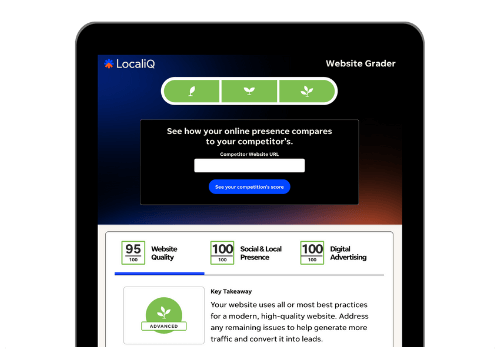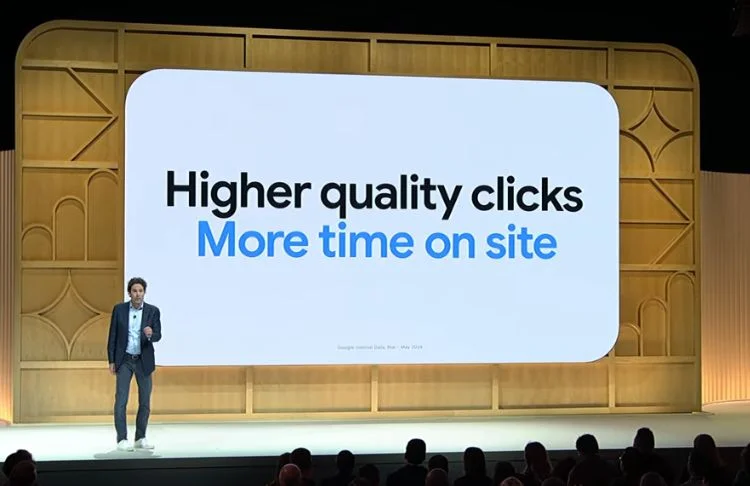In order to thrive as a local business today, you need to be where consumers are, and that is online. Even if you’re a brick-and-mortar establishment, your current customers can only take you so far. It’s essential that you have an online presence where new customers can discover your business and what it has to offer.
In particular, you need a website and local listings. And you need to take particular measures so that these assets show up in search results. This is called SEO, or search engine optimization. The term may sound intimidating at first, but really, it’s just a matter of building trust through quality content. This post outlines how to improve SEO so your business shows up for the right searches, outranks competitors on Google, and gains local visibility.

We’re going to cover:
- How to use your website, content, listings, and keywords to improve your SEO.
- Specific tips for local businesses to improve their SEO.
- Some more general strategies and mindsets for successful SEO.
So let’s get started.
How can local businesses improve SEO?
As consumers increasingly rely on Google and other search engines to find the information, products, and services they need, it is more important than ever for businesses to hone their SEO strategy. SEO encompasses the many different actions a business can take to improve its ranking on search engines.
Three main routes to improving your SEO are through your website structure, your content, and business listings:
Website (on-page SEO)
Website SEO, or on-page SEO, refers to adjustments you can make to your site’s structure and elements you can add to pages that will improve a search engine’s ability to crawl, categorize, and index your pages.
Check how your website is performing with our free website grader.
Content
In addition to website copy, there are longer form types of content you should be publishing to help build your credibility, trust, and domain authority on search engines.
Listings
Online listings in business directories have an influence on your SEO, so it is vital to make sure they are accurate, complete, and consistent across directories. (You can check your listings using our free business listings grader here!)
You should pay particular attention to your Google Business Listing. Google Business Profiles feed into the local section of Google Search (think: “event planners near me”) and also in Maps results (think: “auto repair”). The more complete and accurate your listing is compared to others in your area, the more likely your business is to be at the top results, helping to further improve your local SEO (for more help with your Google business listing, check out these Google Business Profile optimizations).
Read on to learn more about each of these buckets as they pertain to improving your SEO and ranking on Google.
How to improve SEO using your website
Below we will cover ways to optimize each page on your website to boost its chances of getting found by Google and showing up in relevant searches.
1. Optimize titles
The title is the hyperlinked text of your page that shows up in search results. Titles are important for SEO ranking because they are the first thing users look at when scanning through a results page to see which result to click.
To boost your website SEO, every page needs a title and every title should be:
- Compelling: Your SEO title should stand out to users searching out the information your page contains.
- Accurate: Your SEO title should reflect what the page is about, and should not make any promises just to lure visitors in.
- Concise: Search engines only show the first 65-75 characters of your title tag in search results.
In more technical speak, the title of your webpage in HTML code is the <h1> tag. Google looks at the <h1> tag of a page to properly categorize, index, and serve up your page for appropriate searches. Therefore, your titles must contain:
- Keywords: Each page should target different keywords. (We’ll get into keywords later on in this article.)

2. Optimize meta descriptions
The meta description, or SEO description, for a web page is the little blurb that appears below the title in search results. Meta descriptions give users a snapshot of what your page is about, helping them to quickly decide whether your page contains the information they are seeking (and therefore whether to click on it from a search engine results page).
To improve your SEO, make sure every page on your website has a meta description, and make sure every meta description:
- Briefly encompasses what the page is about.
- Is written in the context of what readers will get out of it.
- Contains the keywords that page is targeting.
A solid meta description will drive more relevant traffic to your website pages from search engine result listings — that is, users that will stay on your page once they arrive and look at other pages on your site (thereby reducing bounce rate which can negatively impact your SEO ranking).

3. Optimize images with alt text
Adding supporting images to your website pages enhances the user experience of that page and earns it more favor in the eyes of Google. However, Google can’t see images; it needs a text alternative of that image to be able to detect it and understand what it represents (hence the term “alt text” or “alt tag” ).
To improve your website SEO via images, make sure you tag every image you upload to your website with an alt tag/ alt text. This way, Google can read the image, gather further evidence of your page’s relevancy, and also index the image for image-only searches.
Just as with title tags and meta descriptions, alt text should contain keywords relevant to that page that users are typing into search boxes. (Once again, we’ll cover keywords in more depth later on.)
4. Internally link your website pages
Internal links are the links in pages of your website that lead to other pages of your website. Google favors websites whose pages are internally linked because this creates a coherent network that it can crawl more easily. Google also likes internal linking because it creates a better experience for its users.
When users can navigate around your site with ease, they spend more time there, engage more, and are more likely to return — sending signals to Google that your page is of value, which will improve your SEO.
5. Clean up your URLs
Your URLs are the addresses of each of the pages on your business website. URLs appear underneath the title in search results, so it’s important to make sure they are clean and look secure to searchers.
For example, a cluttered URL with numbers and letters, such as localiq.com/34948_39879_jef890 is:
- Confusing: Not easily readable and hard to remember.
- Unclear: Not indicative of what the page is about.
- Untrustworthy: Lots of numbers and letters can look spammy, and users don’t know where clicking this link will take them.
A clean URL, on the other hand, like localiq.com/blog/seo-website-design is easy to read, clear on what the page is about, and creates minimal risk for the user. With a clear idea of where that URL will take them, they are more likely to click on it. More traffic and more trust translate to improved SEO.

6. Include keywords in your URLs
Be sure to also include the keywords you are targeting in the URLs of your pages. This provides more evidence to Google regarding the content and relevancy of each page. In addition, when linking to other pages via anchor text, match the anchor text to the URL as much as possible. This helps users navigate your site with more confidence and ease, and promotes trustworthiness, coherency, and consistency — all of which work to improve your SEO and Google ranking.
Related: Get more tips to improve local search marketing.
How to improve SEO with your content
The above steps describe how to present and structure your website pages to improve their ranking on Google. The following steps talk about the type and quality of content that will boost your SEO.
1. Start a business blog
Every blog post you write for your business is seen as a unique page on your website by search engines, and therefore a unique opportunity to improve your SEO and rank on Google. Whereas other pages of your website (product or landing pages, for example) should not be too text-heavy (lest users disengage or bounce, which will negatively impact your SEO ranking), blog posts afford more freedom with length. You can use blog posts to go into depth on topics your target audience is looking up online.
Each blog post should target a different keyword, and as mentioned above, should include those keywords in the title, meta description, image tags, and of course throughout the body of the post.
Related: Learn about the types of SEO keywords to include in your content here.
2. Write for people
It goes without saying that search engine optimization involves catering your website to search engines. However, search engines cater to their users, so it is important to make sure your content is written for people and not search engines.
To improve SEO with your content marketing material, make sure it is easy to understand for your target audience. Be professional, authoritative, and trustworthy, but use language and terms that they would use to look up or describe the topics you are covering.
People are looking for businesses run by real people who understand them, and who they can understand and can trust. Presenting helpful information in their terms will keep them on your page longer, engaging with your website more, and returning to your website — which will help to improve your SEO.
3. Do not keyword stuff
SEO writing for people also means avoiding keyword stuffing. Repeating the same exact keyword throughout your content in a robotic way is not going to improve that page’s ranking. In fact, Google will pick up on that and penalize you. Even if Google didn’t notice it, your readers would quickly pick up on the lack of authenticity of the page and exit quickly without interacting with other pages on your website. This translates into decreased time on page and increased bounce rate — which Google will certainly notice.
To improve your rank on Google using keywords, be sure to use variations of your keyword phrase and insert it into your content in a way that sounds like a human wrote it.

4. Promote your content
The more quality traffic you can get to your website pages, the more your SEO will improve, so be sure to share your content to amplify its exposure. Here are some tips to promote your content and improve your SEO and ranking:
- Share links to blog posts and landing pages via social media and email campaigns.
- Reach out to influencers or complementary businesses to see if you can get backlinks to your website in their posts.
- Add sharing buttons to your pages for Facebook, Twitter, Pinterest, and LinkedIn. Your followers are much more likely to share your content if it takes one click versus copying and pasting a link. The more your content is shared online, the greater your SEO will be.
5. Choose the right keywords
The intended result of improving your SEO isn’t just to get more traffic to your website. It’s to attract more qualified traffic so that the people coming to your website are those that are most likely to become leads or customers. There are a lot of popular searches that consumers perform, but you want to make sure the searches you’re trying to show up for are related to your business.
Take a look at the next section for help on choosing the right keywords for your SEO.
Related: Get our local SEO checklist for even more tips to improve your website.
How to improve your SEO with keywords
We’ve talked about the importance of using keywords for your titles, meta descriptions, image tags, and content body — but exactly which keywords should you use? This section will cover how to choose keywords to improve your SEO and Google ranking.
How do keywords improve SEO?
Keywords are a crucial part of SEO. They are the words your target audience is typing into Google searches to find information, products, or services your business provides. In other words, keywords are the means by which search engines connect your business to customers.
Here are nine steps you can take to improve your SEO ranking through keywords.
1. Use keyword tools
While it is a good idea to brainstorm keywords for your business to rank for, this should not be your only approach. What you think your target audience is searching for online may not be what they are actually searching for. Keyword research tools provide real user data to help you confirm whether the keywords you have thought of will improve your rank on Google, as well as to identify additional keywords that you may not have thought of on your own. Google has recently placed restrictions on its free keyword tool, but there are many keyword tool alternatives that you can try.
2. Identify keywords that drive traffic to your website
Keyword tools can be very helpful for finding and suggesting keywords, but keep in mind that the data they provide is generalized for all websites and users.
If you want your website to rank on Google, one of the best resources for this is none other than your website! With an analytics tool such as Google Analytics, you can identify the actual terms people searched for that led them to your website. You can also see which keywords you are already ranking for, and build more keyword clusters from there.
3. Be realistic when choosing keywords
The key to improving your SEO is in being realistic. Yes, you want keywords with a high search volume, but keep in mind that these tend to be general. It is not realistic to think that everyone searching for a general term is looking for your specific service or information.
In addition, if the competition is also high for a particular keyword, it may not be realistic to think that you have a chance at ranking for that keyword. You may have a great blog post with keywords in the title tags, meta content, URL link, and alt tags, but if your expectations for ranking are not realistic, you may end up disappointing yourself.
4. Use long-tail keywords
Being realistic about keywords brings us to one of the most commonly overlooked ways to improve your business’s website ranking on Google — long-tail keywords. What are long-tail keywords? They are longer keyword phrases and the remedy for high volume and high competition keywords!
These longer phrases that incorporate keywords are less competitive because fewer people or companies are able to provide such specific information, and they are more targeted because the people searching those phrases have more intent to engage or buy. You can improve your SEO on Google by finding long-tail keywords for your business most relevant to your target audience and creating content from those.
5. Google search your keywords before deciding
Whether you’re using specific keywords or long-tail keyword phrases to get your business on Google, one very important keyword tip is to always Google search your keywords before using them. This is a way to check to make sure that the content you plan to associate with your keyword is aligned with the content Google associates with that keyword.
Perform a Google search for your keyword and see what other content it pulls up. If the search results don’t reflect the content that you’re writing about, you will either need to change your content or change the keyword you are using.
6. Scope out the competition
While you’re looking at the keyword search results, take an even closer look at your competitors who are already on that first page. Are they large businesses, news sites, or government sites? If these competitors are wildly different from you, or if they have been around for several years, it may be hard to improve your ranking for this keyword. Another observation to make is the form of the content in the results. For example, if the search results are mainly product pages, and you have a blog post, your content may be seen by Google as less relevant. Make sure that what you’re trying to rank for reflects what people are actually searching for online.
7. Check your results
Improving your SEO doesn’t do your business any good if it doesn’t help you reach your business goals and ultimately help you to get more clients for your business. Make sure that you are not just improving your rank in Google, but also improving along with your rank in Google. If your improved SEO is bringing in more qualified website traffic or generating more leads, then your SEO is working for you. If you aren’t benefiting from the improved SEO, you are better off putting your time and energy into a different keyword strategy.

How local businesses can improve their SEO
SEO is a must for any business looking to get found, stand out, and get chosen online. However, for local businesses especially, there are three particularly important points of focus.
1. Focus on your niche market
As a local business, it is important to identify and express that which distinguishes you from nearby competitors and/or larger franchises. Think in terms of the specific products, services, and conditions your ideal customer is seeking out. Do you provide same-day services? Are you the only environmentally friendly business of your kind within a 20-mile radius? Are you pet-friendly?
The more specific you can get about the products and services you provide, the better the chances are that you will rank for searches your ideal customers are performing. This is called niche marketing.
For example, does your health club or martial arts studio teach self-defense classes for women? Don’t just include “self-defense classes” on your services page. Get more specific with something like:
“We are a martial arts studio that provides karate classes to all ages. We also offer specialized self-defense classes for women of all ages, from teens to seniors!“
Your business will be more likely to show up when people search for things like: self-defense, women’s self-defense, and self-defense for teens.
2. Standardize your business name
When Google sees inconsistencies in your online content, it loses trust in you and will be hesitant to put it in front of searchers. Therefore, another quick and easy way your local businesses can improve its rank on Google is to ensure that your name is the same across all online channels — social media platforms, niche directories, review sites, map listings, etc. This might seem like common sense, but many companies do not obey this rule.
For example, if your business name contains the word “company”, do not use “co.” in some listings and “company” in others. Keep it consistent. Also, find one handle you can use for every social media outlet. This will improve your SEO and make it easy for people to find your business online.
There are many ways to optimize your business listings to improve your rank in online searches, but consistency is the most important.
3. Create a Google Business listing
Aside from having a website, the best thing you can do to improve your local visibility and Google ranking is to create and optimize your Google Business Profile. Google Business is making it easier than ever for potential customers to find, learn about, and engage with businesses specific to their needs. Complete with reviews, ratings, directions, posts, and other vital information, it is becoming the go-to directory for consumers. Create your Google Business Profile asap to improve SEO for your business.

Final tips for improving your SEO
So we’ve covered the tactical aspects of using your website, content, and keywords to improve your SEO. Now it’s time to finish off with three more general or strategic tips.
1. Think bigger picture
Knowing what products and services are most profitable and where you’d like to expand in your business is important for setting the foundation for a solid SEO strategy. Don’t think of keywords but of general phrases that make sense for your business, as it stands now and also where you want it to stand in the future.
2. Analyze your traffic
Doing all the above is great, but without measuring the right SEO metrics, you can’t know whether your actions are actually improving your SEO. Google Analytics is the industry standard and allows you to see where your website visitors are coming from and what they’re doing on your website. The insights gathered from this data will help to inform and refine your SEO tactics moving forward.
3. Focus on unique content
There is no way to create lasting SEO success overnight. This is by design from search engines, who are constantly pushing for websites to produce quality work on a consistent basis to get distinguished from spammy, low-quality sites. When it comes to improving your SEO, the importance of authentic content cannot be emphasized enough. Blog posts and videos are a great way for you to present yourself as an expert in the field, answer common questions and show prospects how you work. Releasing these pieces monthly shows both searchers and search engines that you’re a credible, trustworthy resource that is worthy of ranking higher on Google
Proper SEO takes time, so treat it like a 401k. Invest in it each month and over time, you’ll net fantastic results.
Related: Have more than one business location? Get tips to optimize SEO for multiple locations here!







